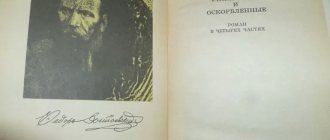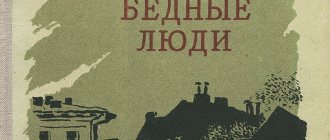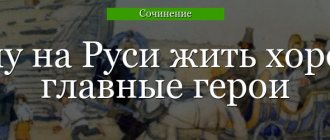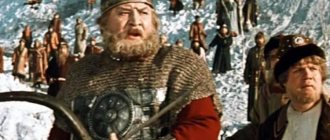Description and detailed analysis of the novel “Humiliated and Insulted” by Dostoevsky
“Humiliated and Insulted” - a novel by F.M. Dostoevsky. The novel was created simultaneously with work on Notes from the House of the Dead. At the very end of 1859, Dostoevsky returned from Siberia to St. Petersburg. During the ten years he spent in hard labor, much changed in Russia. The serfdom was shaken and agonized, patriarchal foundations began to erode, society urbanized and experienced a painful process of social stratification; The power of money left its mark on all spheres of life and morality.
Dostoevsky, in the grip of pochvennik ideas, founded the magazine “Time” to promote his views, the first issue of which was published in January 1861. To be successful, the magazine needed a novel that could interest the reader. “The Humiliated and Insulted” became such a novel. Dostoevsky's new work was published in Vremya from January to July 1861. The same year the novel was published as a separate edition. “Humiliated and Insulted” was a huge success with the public, but reviewers greeted the novel harshly. ON THE. Dobrolyubov considered him “below aesthetic criticism,” A.A. Grigoriev called the heroes dolls, mannequins, walking books. Subsequently, Dostoevsky himself partly agreed with the critics’ accusations.
Today it is difficult to agree with both the harsh verdict of critics and the “humble review” (as defined by K. Mochulsky) of Dostoevsky. It became obvious that the novel “The Humiliated and Insulted” is an experiment during which Dostoevsky for the first time “tested” many techniques, plot devices and even the characters of the heroes, who would then appear in his “programmatic”, fundamental works. The dependence of “The Humiliated and the Insulted” on the melodramatic adventure novels of Frederic Soulier, E. Hsu, V. Hugo, and Charles Dickens does not detract from Dostoevsky’s innovation.
The peculiarities of the compositional structure of the novel include, firstly, the parallel development of plot lines: the story of Natasha Ikhmeneva and the story of Nelly. Everything that happens to these heroines is refracted through the consciousness of Ivan Petrovich, who simultaneously acts both as a narrator, most actively participating in the intense and confusing action, and as a connecting link that unites all the threads of the branched plot, and as a bearer of the philosophical, ethical and social ideas of the author of the novel .
In Dostoevsky’s “The Humiliated and the Insulted,” a peculiar doubling of plot lines occurs: the reader is presented with two daughters who abandon their fathers for the sake of love (Natasha and Nelly’s mother, “Smitiha”); two princes Valkovsky (father and son); Ivan Petrovich’s sacrificial love for Natasha echoes the disinterested, platonic feeling of Heinrich (“Feferkuchen,” as detective Masloboev mockingly calls him) for Nellie’s mother; Heinrich died very young - the same thing will soon happen to Ivan Petrovich, who is finishing the story of his love in the hospital, in complete loneliness and poverty (the expected death of Ivan Petrovich) also mirrors the early death of the critic B. mentioned in the novel.
Other key moments of the action are also tripled or doubled: Smith and Ikhmenev curse their daughters, while Ikhmenev curses Natasha twice; Prince Valkovsky is also cursed twice in the novel: Nellie’s mother and Nellie herself; the story with the purchase of earrings for her birthday is repeated (Nellie’s mother recalls how old man Smith got angry when he learned that his gift was no longer a surprise for her - but old man Ikhmenev became angry about the same thing, and Natasha also remembers his anger with tenderness). Katya is the daughter of a tax farmer, like Alyosha’s mother, who died after several years of marriage to Valkovsky; The prince envisions a 14-year-old girl as his wife, and it is at this age that Nellie dies. The doubling and mirroring of plot lines not only enhances the melodramatic effect of the work, but is also a continuation of the theme of duality that has long interested Dostoevsky. Double heroes complement, explain, deepen each other and the ideas of which they are carriers.
The second important compositional feature of Dostoevsky’s novel “The Humiliated and the Insulted” can be called a love “polygon”, composed of several “triangles”, also, however, not entirely ordinary. Tops - Ivan Petrovich, Natasha, Alyosha. Natasha was once in love with Ivan Petrovich - they grew up together, read the same books, and a spiritual closeness was established between them. Natasha was delighted with Ivan Petrovich’s debut in literature, her parents agreed to the marriage; albeit with a postponement of the wedding. Natasha's sudden passion for Alexei Valkovsky is inexplicable by reason. There is no spiritual closeness between them. Natasha knows that her new chosen one is not smart, she sees all his unpleasant traits and character weaknesses. Compared to her, Alexey is a child. Natasha does not idealize him, but her feeling is not carnal attraction, but sacrificial love-suffering, her cross. Natasha, who decided against her father’s will to go to Alexei, looks like a seriously ill person - she has “sunken pale cheeks, lips parched as if in a fever, and eyes sparkling from under long eyelashes with a fiery fire”; the visit of Prince Valkovsky plunges her into hysterical attack, etc. Ivan Petrovich is also unwell, but his love for Natasha is devoid of strain, he does not experience jealousy, for he is faithful to the idea of spiritual intimacy; Ivan Petrovich suffers, seeing that Natasha is unhappy, he feels pain for her, but not “because of”. At times, Ivan Petrovich experiences an unkind feeling towards his “rival” Alyosha, but only because Alexey does not give Natasha happiness, he torments her.
Oddly enough, Alexei’s attraction to Natasha is extremely chaste: Natasha feels like neither a wife nor a mistress, but Alyosha’s mother, although she is only two years older than him. The “triangle” is not closed: there is no rivalry between Ivan Petrovich and Alexei, and there is no rivalry between Natasha and Nellie. Nellie is frantically jealous of Ivan Petrovich, but the love of a thirteen-year-old girl for an adult is premature and doomed to remain unnoticed and unrequited. The triangle “Natasha-Alyosha-Katya” is not closed either. Alyosha is drawn to both of them, and, unable to choose which of them is dearer to him, offers a fantastic solution to the problem: “...I directly said that I love Katya very much, but that no matter how much I love her, and no matter who I I didn’t love her, I still can’t do without her, without Natasha, and I’ll die. <…> As for Katya, what is it! I can’t live without Natasha... She’ll get married and we’ll also go there with her, where Katya is...”
Other features of the composition may include its multi-figure nature, the abundance of random, sometimes mystical coincidences, thanks to which an intricate intrigue develops. Good and evil are not just clearly expressed in the novel, they are personified. The idea of absolute, victorious evil is embodied in the image of Prince Valkovsky. Valkovsky's literary predecessors are Yulian Astakovich, an elderly, respectable-looking official - a voluptuous man who loves secret, dark debauchery ("The Petersburg Chronicle", "The Christmas Tree and the Wedding") and, in part, the spider-man Gazin from "Notes from the House of the Dead". In Dostoevsky's subsequent novels, Valkovsky's line bifurcates - it is continued, on the one hand, by the “sensualists” Svidrigailov, Fyodor Pavlovich Karamazov, old man Totsky, General Epanchin; on the other hand, “supermans” and “cynics”—Raskolnikov, Kirillov, Ivan Karamazov—and then both lines converge in the image of Stavrogin. Valkovsky is a demonic figure, the “prince of darkness”, who knows how to charm any person in order to use him and mercilessly throw him away like a rag. All the hidden springs of action are concentrated in the hands of Valkovsky; his evil will determines the fates of all the characters: no one can seriously resist him. “A rogue, a descendant of an ancient industry,” he is capable of any crime for the sake of money and power. He marries his son to Katya, because they are “both fools,” and expects to dispose of Katya’s millions at his own discretion. He is a monstrous egoist. In Soviet literary criticism, there was a point of view that Prince Valkovsky was a type of predatory capitalist. However, we must not forget that money, wealth, capital are not a goal for him, but a synonym for unlimited power and perverted pleasures.
The antithesis of the egoist and misanthrope Valkovsky in the novel is Ivan Petrovich - the author of a philanthropic story, a conscious, convinced bearer of the Kantian imperative “good for the sake of good,” an altruist, moralist and loser. The image of Ivan Petrovich gave rise to heated controversy in criticism. Ivan Petrovich was considered both as a reasoner and as an artistic double of Dostoevsky himself in the 40s. - an idealist and romantic, over whom Dostoevsky administered a merciless but fair trial in the 60s. More likely, the image of Ivan Petrovich should be perceived as the forerunner of the “positively beautiful” Prince Myshkin. After hard labor, Dostoevsky acquired an unshakable confidence that the only possible path for a person to happiness lies through suffering. Christ, who accepted suffering for the sake of people, is the ideal given to people. Anyone who suffers for others, sincerely and selflessly, approaches this ideal. The disinterested, chaste, quixotic Ivan Petrovich clearly gravitates toward the ideal of the God-Man (although the religious theme is practically not touched upon in the novel) - at the other end of the scale is Valkovsky, who in his pride imagines himself a Man-God equal to the Creator.
In “The Humiliated and Insulted” by Dostoevsky, everything that will be developed later by the author is outlined: the night scene in a restaurant between the prince and Ivan Petrovich is the first “philosophical conversation”, where a struggle of ideas takes place and where good and evil have the opportunity to come together in an argument, and the judgment of the good is entrusted to the evildoer. Strange, unthinkable in real life, love “for three,” which could save Alyosha, Natasha and Katya, anticipates the tragic triangles “Myshkin - Aglaya - Nastasya Filippovna” and “Rogozhin - Nastasya Filippovna - Myshkin” in “The Idiot”. The antithesis “love-passion” is only stated here, as is the conflict between universal brotherly compassionate Christian love and the love that arises between a man and a woman as a result of their preference for each other over everything else. Detective Masloboev is a kind, but weak and equally capable of good and evil, a lost man who is aware of his doom - the forerunner of Porfiry Petrovich from Crime and Punishment. The theme of money, which constantly arises in the novel, will also carry over into subsequent works, and Alyosha Valkovsky’s phrase “Wealth is the main thing. Nowadays the most important prince is Rothschild” evokes clear associations with the “Rothschild” idea of the novel “The Teenager”.
“The Humiliated and Insulted” by Dostoevsky stands on the threshold of tragic novels. The templates of melodrama, adventure and criminal novels are filled with brilliant psychological and ideological content. F.M. Dostoevsky develops a new narrative style, depicting the life of ideas in a concrete form. The novel is interesting because Dostoevsky does not solve, but poses problems that he will consider throughout his life.
Source: Encyclopedia of Literary Works / Ed. S.V. Stakhorsky. - M.: VAGRIUS, 1998
“Humiliated and Offended” - moral criticism
I cannot hide my admiration, despite the fact that, being an example of morality, F.M. Dostoevsky this time appeared to me in a different light, sick, incorrect, or rather, it would be correct to say distorted. A feeling was born in me, which became the center of gravity. After all, all great people are worthy of criticism. And if I looked at him, I was ready to get a slap in the face. Thank you, and be merciful. Further in a chaotic order, just manage to catch the meaning.
From the very beginning we are told that the hero of the novel is writing a novel, and writing it is difficult. Also, the author completely personifies himself with the main character. And what happens is that Vanya, who has been in love with the Ikhmenevs’ daughter since childhood, and who so zealously follows their lives, finally attacks the plot of the novel. And at that moment, when Natasha falls in love with the son of Prince Alyosha, a young rake, Vanya, sacrificing his own feelings, does not break off relations with Natasha, but on the contrary, begins to become even more interested in family affairs and Natasha’s relationships, and even tries to fall in love with this ill-fated Alyosha, as The author himself tries to love Alyosha. But he does it very superficially; he continually calls the ego stupid, shallow and so dependent on everyone who surrounds him. This continues until the very end of the novel, subconsciously he does not love him and cannot love him, because it was he who took his love from him. Did he take it away? Or did he just give it to a girl who was meeting a man for the first time? A girl who only lived under her parents’ wing, whose parents rejected Vanya for lack of wealth. Natasha, in turn, loves Alyosha to spite everyone, this becomes clear by the end of the plot. To spite Vanya, who, with all the strength of his feelings, retreats. To spite her parents, who never want to let her marry Alyosha. Mainly concerns the old man Ikhmenyev, who has his own scores to settle with the prince, and who considers Natasha a traitor, and he is right. In any case, he has no illusions about a happy ending, unlike Anna Andreevna, who continues to see only a profitable match for Natasha, and meanwhile says, “What did he find in the new one?” (speaking about Katya) So why is he truly leaving? Natasha from her parents' house? Does he want to live with Alyosha? Is he following the lead of his mother, who wants a profitable marriage? Tired of your father's care? To spite everyone who didn't appreciate her first choice? Why does the author, who is so observant and detailed, not understand this situation at all? Why isn’t Vanya interested in true motives? They both do not want to understand Natasha, she is a mystery to them, an object of love and sympathy.
Let us also recall the old man Smith, whom the author, for some reason at the beginning of the work, endows with simply mystical qualities, but not just the qualities of an abandoned father, and this whole scene, described in such detail by Dostoevsky in a cafe on his last day, why was this aggression needed, to evoke us compassion, having previously created an image that is rather mystical? I don't understand. Why wasn't his face cut into lines of agony, doubt and pain? Why these incomprehensible habits that Vanya observed so diligently. But here it’s completely phantasmagoric, when Vanya, out of curiosity, settles in this old man’s apartment, cramped and unlit.
Let us leave and note a truly positive character in this story: Masloboev, unlike all our sincere ones, his hands are dirty “in business.” But he alone can resist evil, he has enough strength and prudence, dexterity and other things to squeeze money from those who are the embodiment of evil. Although, as it turns out, and destroys the too ideal idea, he also “cheaped” with the prince’s case.
And now we come to my favorite characters, they are truly majestic: Nellie and the Prince, proud, arrogant and fierce in their goals. I didn't just put them next to each other; they are father and daughter.
Nellie is the truly tragic creature in this story. It seems to me that everyone else was just playing, Vanya was playing, Natasha was playing (remember at the end of the book, Natasha turns to Vanya: “Tell me it was just a dream”), Nikolai Sergeevich was playing (losing his money in court), Alyosha was playing, Katya played, the Prince played (although he really played), and Nellie died for all these games. It was the child who died, who was supposed to play, but only she truly lived. Meanwhile, Vanya, for me, becomes a much worse character than the Prince, the most cold-blooded, he signs the already sick Nelly a death sentence and does it without the slightest trick, appointing her “the savior of everything.” But he commits his first crime much earlier, when he breaks her stony heart with his notorious love and love of truth. He said she was selfish and spiteful. But she did not break under the pressure, and never became a child. “But Nellie did not fulfill her will: she knew everything, but did not go to the prince and died unexamined.” "I curse him."
How tragic the whole novel is about how insignificant all these lofty feelings are. How erroneous all these lofty truths are in the face of fate-life.
PS:
Letter to the prince.
Actually, what is a prince? ...he always went towards his goal, had no doubts, believed that the goal justified the means. And there was something endlessly playful in his character, this feeling that he tried to evoke in Natasha, a truly repentant person, mischievously flirting with the truth, these words... “There was a time and I was carried away by lofty ideas.” It’s as if the author is saying: The weak go to the bottom. Throughout the whole affair, Vanya and the Prince were at the same time. Remember how Vanya painfully perceived the prince’s words in the last scene in the bar, his deliberate lies? But nevertheless he remained, he sacrificed all his ideas in order to find out... “The prince fell silent, as if thinking about something.”
Reviews of the book “Humiliated and Insulted” by Fyodor Dostoevsky
It's amazing what one ray of sunshine can do to a person's soul!
Fyodor Dostoevsky "Humiliated and Insulted"
“Then suddenly I hear a passionate voice singing, with a bell ringing in unison: “Oh, someday, someday my darling will come to rest on my chest! Don't I have a life? A little dawn on the glass Begins to play with the frost with rays, My samovar boils on the oak table, And my stove crackles, illuminating the bed in the coal Behind the colored curtain ... "
If
If you ask me about my favorite creation by
Dostoevsky
right now, I will immediately answer you that it is
“The Humiliated and Insulted
.
And it’s not that I just read this novel. This is far from true. Everything I read from him over the past fourteen months (starting with “The Idiot”
in April last year) still sits inside me, seething and does not want to let go.
The passion that is present in his works and inherent in many of the characters caught my attention one day. And I think this will last for a very long time. After all, he teaches and helps in life
. And this should already be more than enough...
“A fool who admits that he is a fool is no longer a fool!”
"Humiliated
and the Offended"
- this is a novel not entirely typical of the late Dostoevsky
!
This is the first novel that the writer showed to the world after exile. The novel is airy, wonderful, easy to read, not overloaded with anything, with a huge amount of dialogue, with rapid development of the plot (long live His Majesty the action), and a small number of digressions. “The Humiliated and Insulted”
is a small (for
Dostoevsky
, of course) simple book, which is written in a beautiful style, simple and understandable language about simple, ordinary and not quite people, and about
how fickle this thing is - life
. Today you have one position, and tomorrow (in a year, two...) it’s completely opposite. It is amazing how people can change in this seemingly short period of time under the yoke of external and internal problems; how some people can be broken by certain circumstances. Or they may not break it. They - circumstances - can also temper a person, strengthening his inner peace and love, which often burns with a bright flame in him. For example, just two years ago I would not have thought that I could become (be) a hardened cynic, but now it’s like this... Today a person is full of all-consuming love, aspirations and hopes, and tomorrow he is completely broken, depressed, full of hatred and resentment , and strangled, forced to adapt to life due to changes in life, relationships with people, etc.
“If you want to be respected, first and foremost, respect yourself.
Not
Each novel is capable of causing movements of the heart and spiritual cravings.
Even though I sometimes disagree with Dostoevsky
and am even ready to endlessly argue with him about something, I am once again convinced that he is my writer.
Exactly! And nothing else... I am close to many (by no means all) of the topics he raises and the issues he considers in his work. I sometimes squeal like hell at some of the dialogues he wrote (they are so subtly written and incredibly accurately convey the characters of not only individual heroes, but also entire segments of the population of our great country). I never tire of repeating (although you may be tired of reading about it) how much his work, and this novel in particular, resonates with my current state of mind and my search for answers to all sorts of questions.
This incomparable description of human nature, his nature and inner core, incomparable to anyone or anything, comes to the fore in this novel.
Paragraphs are organically woven between the dialogues and the stories of the characters, emphasizing the above. The pain and suffering of parents who “lost” their daughter, the tossing of their inner selves
and the desire not to show it in public, keeping it to themselves;
the endless torment of a poor child due to the evil of the world around him; gloomy journeys through the gateways and basements of St. Petersburg
.
It’s hard for me to understand why everything has to be done through pain and suffering
.
Why is it necessary to first experience torment and torment in order to love? I believe that the characters seem to be looking for a lot of this very pain themselves. And this is wrong. Not only Fyodor Mikhailovich
, but also other Russian writers of the nineteenth century are guilty of this. Stories of love and love relationships between a man and a woman are the only thing I categorically dislike in the works of our classics!
“A generous heart can love out of pity...”
"Humiliated
and the offended”
are two main stories, closely intertwined. The story of a love triangle, which later turns into a quadrangle, leaves a little cold. All these endless “Ah,...”
,
“Oh,...”
,
“My friend,...”
,
“My soul,...”
, pink snot, hysterical male (!!!) nature and “evil love” towards the end already started to get annoying.
Sometimes it’s really impossible to explain why you can love this or that person. But when they selflessly love such a character as Alyosha
on the pages of the novel,
I give up.
Literally! I don’t understand and I don’t accept.
A nasty, spoiled, whiny and pampered “cadre”, which only the army can correct, causes nothing but disgust. Where is the masculine principle?
Where is the responsibility for your love and your own actions? A sort of daddy's boy, who is completely unsuited to life and is a wimp, who fell in love with two ladies, but at the same time does not miss the opportunity to run to women of easy virtue.
Ugh, two-faced scum!
And two ladies love him.
I don’t have any feelings for one of them, since she is not entirely fully revealed on the pages of the novel, although it is clear that she is the same child as Alyosha
.
An immensely rich child who is unclear who will become. And the second evokes conflicting feelings with her love and her actions. I don't think she should be blamed for them. After all, as they say, you can’t order your heart. This other woman named Natasha
, in turn, is loved by a young man,
Vanya
, on whose behalf the story is told.
A strong man with a loving heart, a little naive, but with a pure soul! Talented writer. Who to worry about, who to give your sympathies to, etc.
- you decide . I will say that I am pleased with how it all ended. One should not have expected a different ending to this story. To Caesar what is Caesar's...
“It’s not the mind that’s important, but what guides it—nature, heart, noble qualities, development.”
Other
history is, in fact, the theme of the humiliated and insulted, the poor and the rich, the strong and the weak
. The eternal story of the “superiority” of “superior” people. This is a tearful story about a cute but bitter girl Nellie
, whose fate turned out to be immensely difficult, a girl who is paying for the actions of her parents and does not understand what can be difficult in forgiveness or in a simple conversation.
Natasha’s
parents, which kills with its injustice , who had the “audacity” to suffer from their kindness and devotion.
Actually, there is nothing new in these stories.
So it was, is and, unfortunately, will be .
There will always be hard-hearted and indifferent people who do not care about anything except their wealth, their position in society, and so on. And at the same time, they do not shy away from the most vile, vile and vile actions. Ugly souls!
Ugh, scum! And the saddest thing is that it is precisely these people who control everything, they are the ones who sit in the corridors of power, weaving endless intrigues against everyone...
And they don’t even care about their offspring, wives, parents
! The presence of such a person nearby can only cause rejection, nausea and a desire to quickly get rid of his company. The terrible fact is that they do not hide their vile essence, do not hide behind masks (no masks will help here), but as if they are specially sticking out and emphasizing all the ins and outs of their creepy being. Poor people are not always pure in heart. It is a fact! There are fallen people. But those who possess it deserve all the most flattering words, love, respect and friendship. People who, despite all their material poverty, remain rich internally and retain their humanity, who can come to the rescue and give their last, will feel all the injustice of this world, but still survive, live, help, save and create...
“I still believe that you can live well in the world. And this is the best faith, because without it it is impossible to live even worse: you would have to poison yourself.”
PS
Be that as it may, I liked the ending for its carefree youth, playfulness, understanding of the past and hope for the future.
With his lordship, he reminded me of the end of one of my favorite books, “Love Thy Neighbor” by Remarque
. The same feeling of warmth and the dawn of a new life...
P.P.S.
Dostoevsky's
inclusion of a story about a political circle. It’s as if I was writing from my own life experience! It probably hurt...
“Then suddenly I hear the same voice singing, with a bell ringing sadly: “Where is my old friend? I'm afraid he will come in and hug me, caressing me! What a life I have! - It’s cramped and dark, and my upper room is boring; blows through the window... Only one cherry tree grows outside the window, And even that one is not visible behind the frozen glass And, perhaps, died a long time ago. What a life! The colorful canopy has faded; I’m wandering around sick and not going to my family, There’s no one to scold me - there’s no dear one...” Only the old woman grumbles...”
The review was written to the music of The White Guard - Maeterlinck's Fairy Tales
and
The White Guard - Only Death
.
Danke für Ihre Aufmerksamkeit! Mit freundlichen Grüßen A.K.






